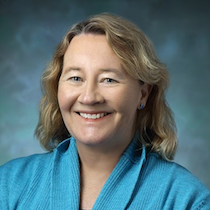 |
Dr. Carol Greider, of The Johns Hopkins University School of Medicine, will deliver the next Dialogues of Discovery lecture at Janelia. Greider’s talk, “Telomeres and Curiosity-Driven Research,” is on Wednesday, November 16, at 7:00 p.m. All Dialogues of Discovery lectures are free and open to the public, but tickets are required for admission. |
|
Telomeres are important structures that protect the ends of chromosomes and maintain chromosome length. Every time a cell divides, telomeres shorten by a small amount. This shortening is counter-balanced by the enzyme telomerase. Telomere length maintenance problems are associated with human disease, including both cancer and age-related degenerative diseases. In this lecture, Greider will give an introduction on telomeres and telomerase and explain some of the experiments she has done in this field over the past twenty years.
Greider received a bachelor’s degree from the University of California, Santa Barbara, in 1983 and a PhD from the University of California, Berkeley, in 1987. In 1984, working together with Dr. Elizabeth Blackburn, she discovered telomerase, an enzyme that maintains telomeres, which protect chromosome ends. In 1988, Greider went to Cold Spring Harbor Laboratory where, as an independent Cold Spring Harbor Fellow, she cloned and characterized the RNA component of telomerase. In 1990, she was appointed as an assistant investigator at Cold Spring Harbor Laboratory, followed later by appointment as an investigator in 1994. She expanded the focus of her telomere research to include the role of telomere length in cellular senescence, cell death, and cancer. In 1997, Greider moved her laboratory to the Department of Molecular Biology and Genetics at The Johns Hopkins University School of Medicine. She was appointed as the Daniel Nathans Professor and Director of the Department of Molecular Biology and Genetics in 2003.
At The Johns Hopkins University, Greider’s group continued to study the biochemistry of telomerase and determined the secondary structure of the human telomerase RNA. In addition, she characterized the loss of telomere function in mice, which allowed an understanding of human short-telomere diseases, such as bone marrow- and stem cell-failure diseases.
Greider shared the Nobel Prize in Physiology or Medicine in 2009 with Elizabeth Blackburn and HHMI Investigator Jack Szostak for their work on telomeres and telomerase.
In her current work, Greider directs a group of eight scientists studying both the role of short telomeres in age-related disease and cancer as well as the regulatory mechanisms that maintain telomere length.
